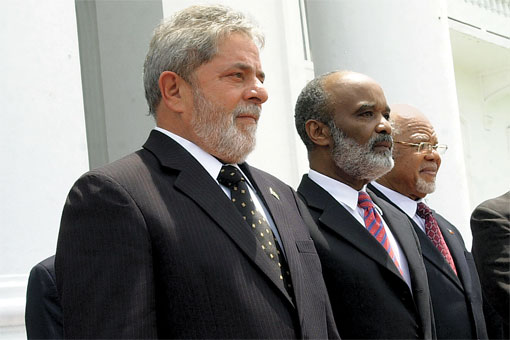Since his recent appointment as United Nations Special Envoy to Haiti, former President Bill Clinton has been called, half-seriously, “president of Haiti” and “viceroy.” The lofty nicknames reflect Haitians’ belief that they have at last found a figure whose international prominence will open a new window of opportunity for this deeply troubled Caribbean nation of roughly 9 million people, where the vast majority eke out a living on less than $1 a day.
Clinton’s selection was warmly received in Washington DC, in Port-au-Prince and among Haitians living overseas—the key stakeholders in Haiti’s future well-being. But that Clinton was brought to the scene at all was a tacit admission that the UN, which has had a force of 7,000 soldiers and more than 1,000 police personnel in Haiti since 2004, lacked the power to turn things around by itself.
The force, known by its French acronym, MINUSTAH, has withstood criticism from almost every quarter in Haiti for failing to curb violence and, in some instances, for abusing Haitians. Still, MINUSTAH’s work has been a catalyst for renewed optimism in Haiti and abroad.
It has, for instance, helped to transform the Haitian National Police into an institution that has won respect from the population at large. Around the Port-au-Prince metropolitan area, police are ubiquitous, and there is a feeling that people are safer than they have been in a long time. People stay out later, and a semblance of nightlife is returning to the bars and restaurants of Petion Ville—the middle class suburb perched on the hilltops overlooking Port-au-Prince. Kidnappings and other forms of violent crime are down throughout the country.
For his part, Clinton has narrowed his mission to a few basic but deeply important elements: disaster mitigation and prevention; ensuring that donors disburse pledges; supporting recovery programs; and getting more private international investors to Haiti. All of these signal a plan to shake loose more money from donors and investors to shore up Haiti’s crippled economy and devastated infrastructure. In effect, he’ll be spending more time outside Haiti than inside, where Haiti’s dysfunctional political system has been as much, if not more, a cause of the country’s economic woes than donor or investor recalcitrance.
“I’m going to go around the world to hector every last dime from everybody who promised to give money,” Clinton said during a gathering of Haitian-Americans in Miami in August. “I’ve been deluged with emails from people I don’t know and from friends of mine, people I didn’t even know did work in Haiti.”…




